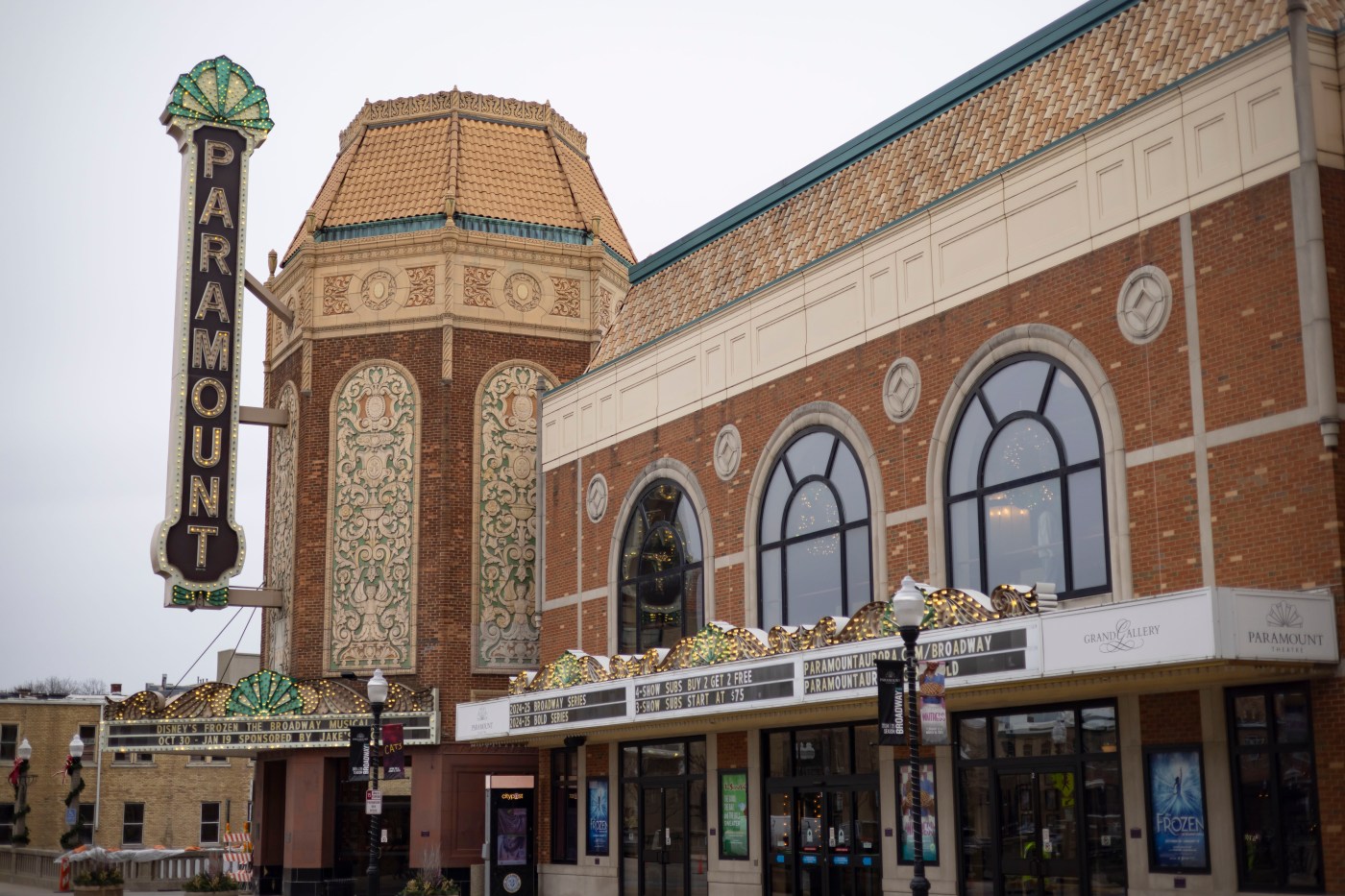Business
Aurora’s 2026 Budget Omits Paramount Theatre Funding, Sparks Concerns

A proposed budget for the city of Aurora in 2026 has raised alarms after it excluded previously discussed funding for the Paramount Theatre. This decision comes in the context of a projected budget deficit that has prompted significant cuts across city departments.
The Paramount Theatre recently announced it would cancel the BOLD Series of shows at the Copley Theatre due to anticipated funding reductions. Initially, the city had communicated a financial support of **$7 million**, but theater officials indicated this could be reduced by as much as **65%**. In light of the latest budget proposal, both city and theater officials have confirmed that no funding for the Paramount will be allocated at all.
“I was surprised,” said Tim Rater, President and CEO of the Aurora Civic Center Authority, which oversees the Paramount Theatre. He expressed hope that additional funds might still be secured, noting that the budget is not yet finalized. “But it’s concerning,” he added.
The Aurora Civic Center Authority manages not only the Paramount Theatre but also the Copley Theatre, the Paramount School of the Arts, North Island Center, RiverEdge Park, and Stolp Island Theatre. It relies on financial support from the city, which is typically provided through a contract related to RiverEdge Park and a head tax from the Hollywood Casino in Aurora. These payments are included in the proposed budget for 2026.
Under former Mayor Richard Irvin, the city had indicated it would provide the additional **$7 million** to help bridge a budgetary gap for the Civic Center Authority. This funding was part of a three-step plan aimed at achieving long-term financial sustainability for the organization. However, current Mayor John Laesch halted a crucial aspect of that plan shortly after taking office in April, which involved a proposed **4,000-seat theater and event space** known as the City of Lights Center. Laesch has expressed concerns over the amount of funding allocated to the Civic Center Authority, stating that the city had been providing “way too much.”
During his time on the Aurora City Council, Laesch frequently addressed the need for the Civic Center Authority to establish financial stability. He has suggested various strategies to achieve this, but recently noted a lack of progress in implementing these measures. Laesch previously indicated to The Beacon-News that he wanted to avoid a steep decline in funding for the Civic Center Authority but acknowledged that financial realities would dictate the outcome.
Aurora officials have reported a significant budget deficit for 2026, estimated at around **$30 million** earlier in the budgeting process. The recently released budget proposal indicates a **$2.5 million** deficit, alongside extensive funding cuts and nearly **140** fewer positions. At a meeting in mid-October, Laesch stated that neither his administration nor the previous one had budgeted any lump sum payments to the Aurora Civic Center Authority.
The city had previously allocated some federal pandemic relief funds to the Civic Center Authority and purchased a downtown parking garage for **$10 million**. Laesch described this as “creative maneuvering” during an October meeting.
In a City Council meeting on October 14, actors from the Paramount Theatre urged city officials to invest in the Aurora Civic Center Authority, highlighting the positive economic impact of the arts. Andrea Prestinario, an actor involved with the theater, emphasized the link between the success of the Paramount and the revitalization of the downtown area.
Laesch acknowledged the importance of keeping the Paramount open but cautioned that many residents would feel the financial strain. “It’s not great, and there’s just no money,” he remarked, adding that without a significant tax increase, the city cannot adequately address its financial challenges.
Aurora has made budget cuts but has halted further reductions to avoid jeopardizing public safety and other essential services. Laesch mentioned that ongoing negotiations with the Aurora Civic Center Authority are underway, with the city requesting a detailed breakdown of its financial needs. However, Rater stated that the Authority has been doing everything possible to manage its finances.
The Civic Center Authority has already implemented cuts, reducing its full-time staff by over **20%** and eliminating part-time positions. The cancellation of the BOLD Series was part of an effort to align its budget with the city’s anticipated funding. Rater indicated that if the city council approves the proposed budget, further cuts will be necessary, potentially affecting operations at RiverEdge Park and other facilities.
In a letter to the city dated September 2, the Civic Center Authority outlined its budget development process, initially projecting a deficit of **$7.7 million**. This figure was later reduced to **$5.6 million** through staffing cuts and the cancellation of the BOLD Series. The Authority requested funding from the city to prevent further drastic changes to its programming.
The letter also discussed efforts to increase revenue, including raising ticket prices and enhancing contributions. A recent study estimated that the organization could potentially raise **$25 million** over the next five years, contingent upon reliable city support. The Authority expressed understanding of the city’s own financial constraints and suggested a gradual reduction in support over the following three years.
Rater noted that through discussions with city officials, he had anticipated receiving **$2.5 million** in support for the Civic Center Authority, which he described as a “worst-case scenario.” He indicated that the Authority has made further cuts to align with this funding expectation, although Laesch has suggested that the amount could be lower as the budget process continues.
As the Civic Center Authority grapples with its financial challenges, it is reevaluating pricing across various services, including tickets and venue rentals. Despite the absence of funding in the proposed budget, Rater remains hopeful that Aurora officials will prioritize financial support for the Authority, emphasizing the importance of continued investment in the community’s cultural assets.
The proposed budget for Aurora is currently under review by the City Council’s Finance Committee and is set for final approval in early December. Both Rater and Prestinario maintain optimism that the city will reconsider its position, as the budget discussions are ongoing. Prestinario expressed her disappointment with the city’s decision to cut funding, highlighting the transformative role the Paramount has played in the downtown district. “I don’t know why they think that cutting out support for the one thing that has transformed the downtown district is the way to go,” she stated.
-

 Top Stories1 week ago
Top Stories1 week agoMarc Buoniconti’s Legacy: 40 Years Later, Lives Transformed
-

 Sports3 weeks ago
Sports3 weeks agoSteve Kerr Supports Jonathan Kuminga After Ejection in Preseason Game
-

 Politics3 weeks ago
Politics3 weeks agoDallin H. Oaks Assumes Leadership of Latter-day Saints Church
-

 Science3 weeks ago
Science3 weeks agoChicago’s Viral ‘Rat Hole’ Likely Created by Squirrel, Study Reveals
-

 Business3 weeks ago
Business3 weeks agoTyler Technologies Set to Reveal Q3 2025 Earnings on October 22
-

 Lifestyle3 weeks ago
Lifestyle3 weeks agoKelsea Ballerini Launches ‘Burn the Baggage’ Candle with Ranger Station
-

 Lifestyle3 weeks ago
Lifestyle3 weeks agoDua Lipa Celebrates Passing GCSE Spanish During World Tour
-

 Health3 weeks ago
Health3 weeks agoRichard Feldman Urges Ban on Menthol in Cigarettes and Vapes
-

 Entertainment3 weeks ago
Entertainment3 weeks agoZoe Saldana Advocates for James Cameron’s Avatar Documentary
-

 Health3 weeks ago
Health3 weeks agoCommunity Unites for Seventh Annual Mental Health Awareness Walk
-

 Sports3 weeks ago
Sports3 weeks agoPatriots Dominate Picks as Raiders Fall in Season Opener
-

 Business3 weeks ago
Business3 weeks agoMega Millions Jackpot Reaches $600 Million Ahead of Drawings








